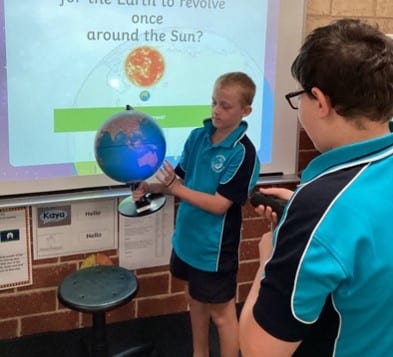Earth and Space Science is alive and well at Riverside ESC. Students across all year levels have been working hard investigating, exploring, and inquiring about our Earth, Moon, Sun and solar system.
This is of particular interest to everyone given this is the year of a Total Solar Eclipse – a highly unusual astronomical event that represents a unique opportunity for all Western Australians. In fact we shall be the envy of the world provided the skies are clear on April 20 when the shadow of the moon will to varying degrees touch our state. Those lucky enough to be in or near Exmouth will experience a total eclipse. We in Mandurah will see approximately a three-quarter eclipse, more than enough to be very exciting.
Science content in our curriculum is divided into three strands: Science Understanding, Science as a Human Endeavour, and Science Inquiry Skills. Individual learning goals have been agreed upon by teachers in consultation with parents and are based on these three strands. It has been wonderful to see students already making good progress thus far.
Our Kindy and pre-primary students have explored daily and seasonal environmental changes and how they affect everyday life. Our year 1 and 2 classes have investigated observable changes in the sky and landscape through weekly weather journals. In addition, Year 1 and 2 have expanded their understanding of the night sky by exploring and investigating the different Moon phases. Our year 3 /4 classes have also been busy recording weather observations through weekly weather journals and analysing how Earth’s rotation and revolution create regular changes. Finally, our year 5/6 classes have built on their prior knowledge of Earth’s movement through exploring the solar system and the time it takes for other planets to orbit the sun.
By developing an appreciation of the movement of that happens all around us, including in the skies, the students eyes are being opened and minds engaged. There are real and spectacular events to observe, such as the solar eclipse in less than 3 weeks time!
Our science teacher said, “It has been wonderful to witness our students expand their science knowledge and understanding, work hard toward their goals and continually inquire about the world around them. Keep up the great work, scientists!”
When will the eclipse be visible in Mandurah?
Begins: Thu, Apr 20, 2023 at 9:59 am
Maximum: Thu, Apr 20, 2023 at 11:19 am
Eclipse Magnitude: 0.757 (about 76% of the sun will be obscured by the moon)
Ends: Thu, Apr 20, 2023 at 12:45 pm
Duration: 2 hours, 46 minutes
Safety is Very Important
Looking directly at the sun will damage eyesight. It is essential that for anyone viewing the eclipse that safety measures are known and practised. For that reason we ask that you follow the guidance of the WA Chief Health Officer by referring to https://www.health.wa.gov.au/Articles/S_T/Solar-eclipse-risk-of-permanent-eye-damage.

